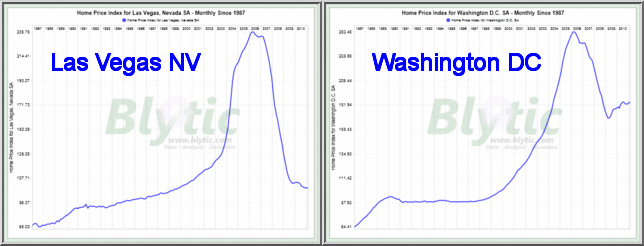US home prices fell 1.1% in the one month period from January to February, according to the Standard & Poor’s Case-Shiller index for February. February’s data shows that the price declines are accelerating, according to CNBC. Housing prices continue to perform much worse than economists expected.
 Home prices, 1987-Present, Las Vegas, Washington DC
Home prices, 1987-Present, Las Vegas, Washington DC
Home price declines vary in different cities across the country. The above graphs from blytic.com show housing prices from Las Vegas, which are typical for almost every city in the survey, with accelerating downward prices. The exception is Washington DC, which is shown on the right, and which is presumably benefiting from the largesse of federal politicians.
Karl Case and Robert Shiller, the authors of the index, were interviewed on Bloomberg TV on Tuesday. Here is my transcription of some excerpts:
CASE: We had a sharp decline [in housing prices] after the peak in 2006, but that ended with the housing tax credit [in 2009]. Then we had a pretty good rebound at that point, and that’s now turned around and it’s almost back to where it was. So in a sense , we’ve already had a second dip [in prices], and I think it’s in large measure due to this incredible decline in households.
If you look at the housing as a market as a whole, and you look at household formations as the demand side — new households being formed, and coming to the market to the market with income — and on the other side of the market, housing production. Housing production has been zero basically for the last 33 months. Housing starts are down around 500,000 — we’re not building any new houses.
But the vacancy rates are still going up, despite the fact that there’s very little production. We’ve always been able to count on new households coming into the market, and they’re not coming now.
SHILLER: There are numerous other factors that I see. The unemployment rate is at 8.8%; long term unemployment rate is 4%, which is quite high; it’s hard to get financing; lenders say that they’ve raised the credit score that’s required to get a mortgage; people are just worried, and holding. The household formation is one symptom of that.
CASE: [For things to change,] I think that households have to come back, and it may be that price has to go down more to bring them back. If you look at housing today, relative to what it was 3 years ago — first of all, prices are down 30% — no one imagined they’d go down that far. Rates are at all time record low.
So affordability is terrific relative to the last four years, but people aren’t buying, because the sentiment has changed completely — they know there’s risk now.
This analysis doesn’t even count the “shadow inventory” of 7 or 8 million homes that are in foreclosure or close to them. (See “‘Shadow inventory’ of unsold homes continues to grow.”)
The last part of this interview really emphasizes the generational aspects of the housing crash. People have been burned and continue to be burned, and this will make them risk-averse for the rest of their lives.
The net of this is that housing prices are still falling, and will continue to fall for many years. Housing prices today are around their year 2000 price levels; my own estimate is that they’ll fall to their levels in the late 1980s.
Meanwhile, China’s housing bubble a year ago was large enough so that there’s enough commercial real estate under construction to give every man, woman and child in the 1.4 billion population counrty a 5×5 cubicle. (See “5-Feb-10 News – China’s nationalism and real estate bubble grow.”) There are similar figures for residential housing.
The housing bubble continues to grow in China, where the price-to-income ratio has now reached a stratospheric 27:1, according to Financial Times (Access), putting homes out of reach for all but the wealthiest people.
It’s almost impossible to get analysts to concede that China has a serious housing bubble, just as it was impossible in 2006 to get any mainstream economists or analysts to recognize a housing bubble in America.
But the article quotes one Hong Kong analyst who agrees that China’s housing is in a huge bubble, but according to him, that’s a GOOD thing. The reasoning is that since middle class Chinese can’t afford a house, they’ll have money left over that they can spend on more consumer goods, which is good for China. There seems to be just no end to the number and absurdity of excuses that mainstream analysts can provide to explain away bubbles — until the bubble crashes, and then it’s too late.
COMMENTS
Please let us know if you're having issues with commenting.